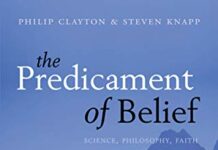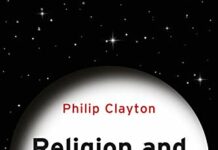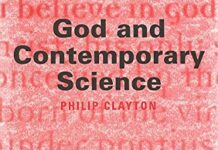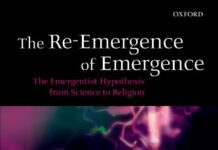
Ebook Info
- Published: 2006
- Number of pages: 256 pages
- Format: PDF
- File Size: 3.10 MB
- Authors: Philip Clayton
Description
Strong claims have been made for emergence as a new paradigm for understanding science, consciousness, and religion. Tracing the past history and current definitions of the concept, Clayton assesses the case for emergent phenomena in the natural world and their significance for philosophy and theology. Complex emergent phenomena require irreducible levels of explanation in physics, chemistry and biology. This pattern of emergence suggests a new approach to the problem of consciousness, which is neither reducible to brain states nor proof of a mental substance or soul. Although emergence does not entail classical theism, it is compatible with a variety of religious positions. Clayton concludes with a defence of emergentist panentheism and a Christian constructive theology consistent with the new sciences of emergence.
User’s Reviews
Editorial Reviews: Review `Review from previous edition Endorsement: Philip Clayton provides here a carefully considered and closely argued defence of the idea of strong emergence in relation to both the natural sciences and the human mind. The erudite argument is well-grounded in the relevant literature and solidly related to the evolutionary process whereby complexity has come into being. The book will be an indispensable reading for those concerned with the `big questions’ related to the human mind, such as issues of agency and freedom.’ George Ellis, University of Cape Town About the Author Philip Clayton is Ingraham Professor, Claremont School of Theology; Professor of Philosophy and of Religion, Claremont Graduate University.
Reviews from Amazon users which were colected at the time this book was published on the website:
⭐Philip Clayton teaches philosophy and religion at the Claremont School of Theology. He wrote in the Preface to this 2004 book, “How humans construe the world and their place in it matters deeply, even ultimately, to humans. Some of us are ‘physicalists,’ holding that all things that exist are physical entities, composed out of, and thus ultimately explainable in terms of, the laws, particles, and energies of microphysics. Others are ‘dualists’ because they believe that at least humans… consist both of these physical components and of a soul. self, or spirit that is essentially non-physical. EMERGENCE, I shall argue, represents a third option in the debate and one that is preferable to both of its main competitors…“I approach this project with the sense that each of these two views omits a crucial part of the story. On the one hand, the physicalist stance leaves out our experience as conscious agents in the world. Nor only do humans have the experience of thinking and willing and deciding; we also continually experience the fact that these thoughts and volitions actually DO something… Dualism, on the other hand, is undercut by the increasingly strong correlations that neuroscientists are demonstrating between states of the central nervous system and conscious states…“Emergence is the view that new and unpredictable phenomena are naturally produced by interactions in nature; that these new structures, organisms, and ideas are not reducible to the subsystems on which they depend; and that the newly evolved realities in turn exercise a causal influence on the parts out of which they arose. The emergence thesis suggests that consciousness or what we call mind is derived from and is dependent upon complex biological systems… I will defend the thesis that mind—causally efficacious mental properties—emerges from the natural world, as a further step in the evolutionary process.” (Pg. v-vi)He states four features generally associated with the concept of emergence: “ONTOLOGICAL MONISM: Reality is ultimately composed of one basic kind of stuff. Yet the concepts of physics are not sufficient to explain all the forms that this stuff takes… PROPERTY EMERGENCE: The discover of genuinely novel properties in nature… THE IRREDUCIBILITY OF EMERGENCE: Emergent properties are irreducible to, and unpredictable from, the lower-level phenomena from which they emerge… DOWNWARD CAUSATION: Higher-level entities causally affect their lower-level constituents.: (Pg. 3-6)He explains, “commentators are widely agreed that twentieth-century emergence theories fall into two broad categories. These are best described as ‘weak’ and ‘strong’ emergence… Strong emergentists maintain that evolution in the cosmos produces new, ontologically distinct levels, which are characterized by their own distinct laws or regularities and causal forces. By contrast, wea, emergentists insist that, as new patterns emerge, the fundamental causal processes remain those of physics… such emergent structures … should not be viewed as active causal influences in their own right.” (Pg. 9)He says, “If forced to give a one-sentence definition, I would say that emergence is the theory that cosmic evolution repeatedly includes unpredictable, irreducible, and novel appearances.” (Pg. 3)He suggests, “Do the phenomena of religion present themselves with the same autonomy as conscious experience does? Do religious experiences demand to be treated as a new emergent level as well? As attractive as this conclusion would be from a religious perspective, I do not think that it is true. From an emergentist standpoint alone, the existence of religious or spiritual experiences in humans need not represent anything more than a highly complex part of human social-biological existence… there is nothing about the range of religious phenomena that REQUIRES causal powers higher than those we know humans to possess. In some ways, it is … all too human, to form religious beliefs, engage in religious practices, and have religious experiences.” (Pg. 59)He argues, “The lesson here is GRADUALISM: anentropic living systems display purposive behavior not found in more simple systems, then gradually manifest more complex internal feedback loops and higher degrees of self-monitoring. With increasing complexity the central nervous systems of animals are able to contain more complex internal representations of the surrounding environment, to the point that a primitive internal theory of other minds begins to evolve. The internalized world of symbols and representations that is consciousness emerges not long afterwards.” (Pg. 99)He notes, “Any account of consciousness faces two major challenges. It must explain what role brain structure and processes play in higher order cognitive functions, and it must account for our own lived experience of the conscious life… emergence theories responds … with the claim that conscious phenomena are properties that emerge only through the functioning of increasingly complex neurological systems. Now I am not certain that emergency theory would be falsified if awareness turns out to be correlated with one particular type of neuron or with a small group of neurons. But… the standard defense of the position would certainly be undercut by a non-holistic neuroscience of consciousness.” (Pg. 117)He acknowledges, “emergentist monism … would be falsified if it turned out that, in the course of universal evolution, only one strongly emergent property had appeared. In that case one would have to accept some sort of temporalized dualism… By contrast, emergentist monism is supported if… natural history produces entities that evidence a range of hierarchically ordered emergent properties.” (Pg. 128)He comments, “it could be that some of the beliefs that humans form about the reality of mental causation are true… and hence that physicalism is wrong. But perhaps the reality of mental causation is a brute given of evolution, with no broader metaphysical implications or entailments… Instead, the universe… eventually produced conscious beings who possess mental attributes … and who correctly view themselves as mental, rather than purely physical, beings. In this specific sense the universe did become mental, and may even have taken on attributes of deity. But no broader metaphysical conclusions follow such as that a God must have created the world. Call it the doctrine of CONTINGENT EMERGENCE. On this view, the evolutionary process from the big bang onward was not the product of conscious choice or design, since no conscious being existed at the time of the big bang. Hence one cannot make any predictions about the future of mind in the universe.” (Pg. 160)He admits, “I have presupposed that there is a certain presumption in favor of naturalism… one can accept an epistemic presumption in favor of naturalistic explanations and still hold that it is metaphysically possible that, unbeknownst to us, the regularities of the natural world are occasionally, or perhaps frequently, broken by direct interventions of God. But, for reasons classically formulated by David Hume, I assume that the initial presumption in both cases must favor explanations given in terms of natural regularities.” (Pg. 163) But he adds, “I am forced to admit some weakening of the presumption [of naturalism] when the task becomes to show the superiority of naturalism as a metaphysical position.” (Pg. 165)He summarizes, “The naturalist is left with questions that cannot be answered… but she does have stronger empirical means at her disposal for resolving those questions that she does countenance. The theist has broader explanatory resources at his disposal, so that what were once brute givens come to have a place within the explanatory narrative; yet the reasoning that supports the position must venture beyond the well-known constraints and decision mechanisms provided by the natural world. If you think the cost of transcendence is too great, you have to pay the cost of unanswered questions… I have argued that the explanatory gain of transcendent mind is greater than what is lost by moving beyond the parameters of purely naturalistic explanations.” (Pg. 179)He concludes, “Emergence … steers a middle course… The question at issue is… whether the natural sciences will eventually be able to comprehend ALL of the levels that are relevant for a causal explanation of phenomena in the universe. I have suggested that the evidence… supports a negative answer… The continuing explosion of scientific knowledge in the twenty-first century will tempt many to conclude that beyond the reach of natural science there is no knowledge, only opinion and affect. The emergence argument … is one way… to show why the equation of knowledge and natural science is mistaken… Indeed, does not rational debate of the ‘really big questions’… become increasingly important as the human mind continued to expand the limits of its knowledge, and… of its limits, in an age of science?” (Pg. 205-206)This book will be of keen interest to those studying contemporary theology—particularly as it intersects with science.
⭐A good book introducing the concept of Emergence in both epistemic and religious terms. Clayton breaks down the subject of Emergence and it’s applicators to the Mind in several steps, all carefully outlined. If nothing else, it helps serve as a push back against the reductionist, physicalist takes that are so fashionable in some quarters. This is not a text to be tossed aside without careful examination, and it requires a considerable amount of careful reading. There are those who will, no doubt, chuck it aside as it will fail to meet the narrow dogmatism of their world views, but to do so is to risk missing the points it raises. It is dense, and not for someone who is not familiar with philosophy, quantum physics, the history of science, and trends in modern thought. It’s not really for “beginners” but is an excellent resource for those interested in the field.
⭐Am giving author five stars knowing I disagree with him alot. Yhe problem with this text is the price.Please, please understand, it is most often not the aithor who establishes price-publishers do that.
⭐This book is fine if you are a philosopher and interested in the concept of emergence. But if you are looking for a readable book, this is not for you. Phillip Clayton can write in an understandable way, but in this book he uses a very hard to understand style.The book indicates that the concept of emergence is not well defined and the reader is likely to feel as confused after reading it as they did before. I would only recommend this book for an academic with a background in philosophy who is pursuing emergence as a concept. For the rest of us, it can be used as a sleep aid.
⭐I have yet to read the book but the three reviews here are of no help whatever since they do nothing but explain their own philosophical views or lack of background in the subject matter.
Keywords
Free Download Mind and Emergence: From Quantum to Consciousness in PDF format
Mind and Emergence: From Quantum to Consciousness PDF Free Download
Download Mind and Emergence: From Quantum to Consciousness 2006 PDF Free
Mind and Emergence: From Quantum to Consciousness 2006 PDF Free Download
Download Mind and Emergence: From Quantum to Consciousness PDF
Free Download Ebook Mind and Emergence: From Quantum to Consciousness



